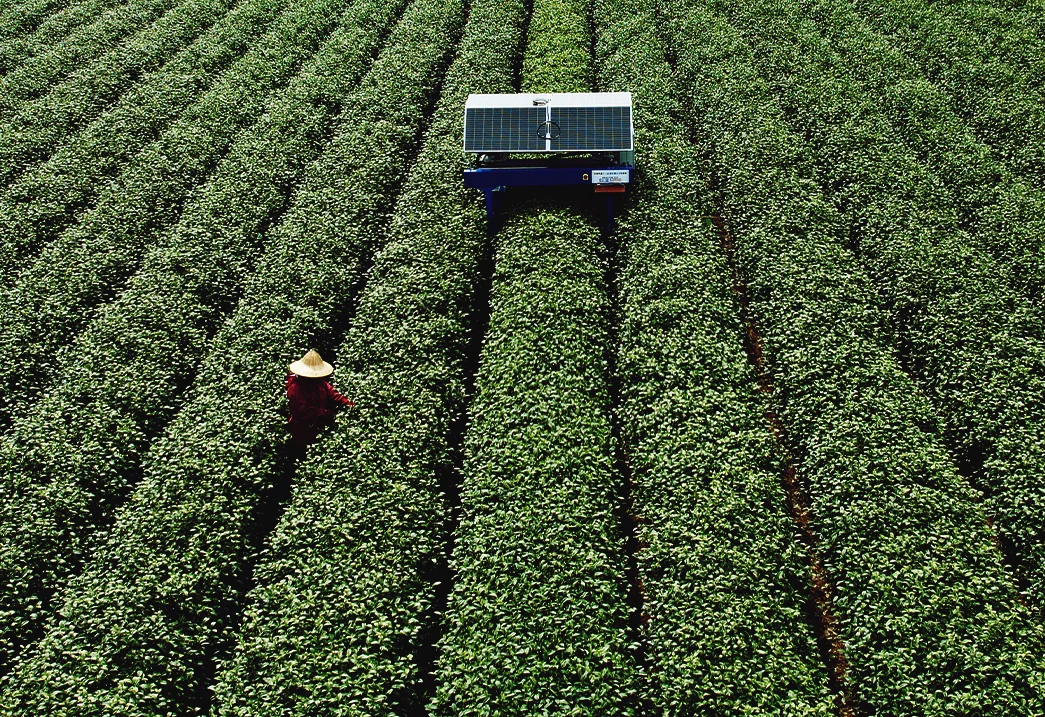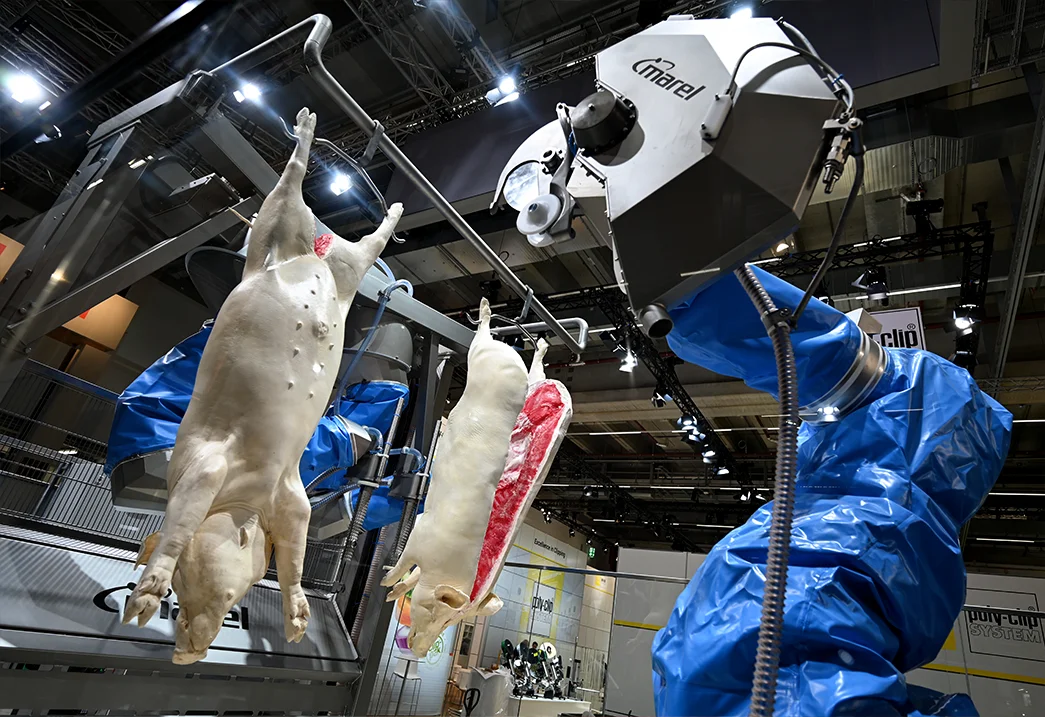How AI is Cooking Up the Future
Artificial intelligence (AI) has become an important part of our daily lives. Beyond chatbots and self-driving cars, AI is making significant strides in the agri-food industry. Find out how AI could reshape the entire food chain.
Artificial intelligence (AI) is a field of computer science focused on creating algorithms to perform tasks that typically need human intelligence. By handling various types of data, such as images, texts, and sounds, AI enables advanced data analysis, which can provide valuable insights to address a diverse range of challenges. Challenges like the ones our food systems face today.
The agri-food industry faces numerous challenges, ranging from the impacts of climate change and food waste to the increasing demand for food amid limited production space. In 2020, the European Union (EU) took steps to address these issues by approving several action plans aimed at achieving climate neutrality by 2050. At the heart of this climate-focused policy initiative is the Farm to Fork strategy, which seeks to transform food systems, making them more sustainable and resilient.
Recently, artificial intelligence (AI) has emerged as a promising tool to address problems across the entire food chain, providing innovative solutions in areas such as food production, food safety, food quality, and supply chain management—the network of people and processes that moves products from production to consumers. These AI-driven solutions could play a critical role in shaping and supporting the EU's new policy framework. However, while AI offers significant potential, it also raises ethical and practical concerns if not implemented responsibly, underscoring the need for careful consideration and regulation.
Smarter farming
Traditional farming methods, such as large-scale monocultures, are no longer adequate to meet the projected surge in global food demand, which is expected to rise by 59% to 98% by 2050. This unprecedented increase in production will transform the agrifood industry in ways previously unimaginable. To boost crop yields, farmers around the world must address pressing challenges like crop diseases, inefficient storage management, pest control, weed management, and water scarcity.
The integration of new technologies offers promising solutions to these issues. Even today, advancements like robotics, drones, and autonomous vehicles can optimize farming practices. AI-powered machines can collect valuable data on crop health, weather patterns, and environmental changes, providing farmers with actionable insights to enhance their decision-making. These innovations enable farmers to work more efficiently—smarter rather than harder—potentially leading to higher yields and improved productivity. While these technologies may seem expensive upfront, the long-term benefits include increased efficiency and production. For instance, AI-driven robotics can revolutionize labor-intensive tasks: a strawberry-picking robot can match the output of 30 human workers in the same timeframe. Another example is AI-powered weeding technology, which reduces herbicide use by up to 90% compared to conventional methods while cutting costs by 30%. Such advancements demonstrate how technology can play a pivotal role in shaping the future of sustainable agriculture.
AI can also be implemented on less conventional farming operations, such as regenerative farms. Recent research has claimed that regenerative agriculture should be combined with modern agricultural technology and data science, such as AI, to maximize its effectiveness. Their interplay might help to gain more insight into the soil status as well as optimize land productivity.
An AI tea-picking robot at a tea plantation in Hangzhou, China, 2023. It is understood that the AI tea-picking robot can accurately identify tea buds through image recognition.
AI in food processing
Food processing encompasses a wide range of operational practices, and in the EU alone, over 4 million people are employed in food manufacturing.
*Eurostat (2020). ‘Employment in food supply across EU regions’. ec.europa.eu. Accessed June 10th, 2023.*
These workers frequently carry out repetitive tasks, which can lead to errors. Additionally, the food sector grapples with challenges such as labor shortages and challenging working conditions, including slippery floors, excessive noise, and non-ergonomic postures. Autonomous food manufacturing could provide a solution to these issues by addressing rising food demand, staff shortages, and inefficiencies in production rates. Moreover, autonomous robots may offer superior management of sanitary procedures compared to human workers.
*Ngige (2022). ‘Robotics use growing at “breathtaking speed” as food & bev industry automation increases 25% - IFR report’. agfundernews.com. Accessed June 10th, 2023.*
Globally, the installation of robots for automating repetitive food processing tasks has grown by nearly 20% year-over-year.
Despite this significant increase, food and beverage automation lags behind other industries, such as automotive manufacturing. Several food-specific challenges remain, particularly the variability in the shapes and sizes of natural products, which complicates robot programming. To tackle this biological variability, AI-controlled robots can be deployed, as AI is well-suited to managing such inconsistencies. Beyond automating process steps, AI-powered robots can minimize human error and enhance safety standards, unlike human workers who might inadvertently introduce pathogens—such as bacteria, viruses, or other disease-causing microorganisms—into food through illness or inadequate hygiene practices ..
Some common and emerging applications of AI-controlled robotics in food production include picking, placing, cutting, and slicing food products like fruit, vegetables, fish, and meat. However, automating these tasks is especially challenging for cooked and prepared products, as they might be non-rigid, fragile, and easily damaged. Moreover, they could be randomly distributed or stored within containers instead of aligning on a conveyor belt. This unpredictable positioning presents challenges for automated processes, such as gripping a single item from a full box or precisely cutting the food. Another barrier is the upfront implementation cost, with specialized robots often carrying a price tag of up to €150,000 - potentially limiting smaller businesses to benefit from this technology until pricing becomes more competitive.
Icelandic company Marel presented a meat-processing robot at a meat industry trade fair in Frankfurt in 2022.
Better food safety & higher-quality products
Recently, AI has been increasingly used to enhance food safety measures. Food safety involves ensuring that food is handled, prepared, and stored in a manner that prevents contamination and reduces the risk of foodborne illnesses. This includes implementing practices and regulations that protect against harmful substances, such as bacteria, viruses, or foreign objects.
By predicting the risk of bacterial infections, AI can help prevent outbreaks and improve the overall safety of food products. For example, AI can accurately forecast the shelf life of perishable goods like eggs, milk, and meat, aiding in inventory management and waste reduction. While traditional shelf life predictions often rely on kinetic models, AI can combine multiple factors, such as pH
fluctuations in storage temperature, and visual changes, to create more accurate forecasts of shelf life.
Cui, Zheeng, Wang, Tan, Li, Li & Li (2023). ‘Recent advances in shelf life prediction models for monitoring food quality’. Comprehensive Reviews in Food Science and Food Safety. Accessed August 7th, 2023.
Several rising technologies, such as the e-nose and e-tongue that, combined with AI analytics, can "smell" and “taste” coffee and tea to estimate their quality based on specific flavor profiles.
AI-based systems also play a significant role in assessing and enhancing food quality - including taste, texture, appearance, nutritional content, and freshness. For instance, AI-based systems can be used in the sorting of fruits, vegetables, cereals, and nuts, using image analysis to categorize and ensure consistent quality. In the brewing industry, AI technology could even help you to produce recipes at the same level as a master brewer.
Smoother supply chain management
Transportation of perishable food across the supply chain faces numerous challenges around storage costs, inventory management, route optimization, and traceability. These challenges affect both global and small local food providers, who want to find the most efficient ways to do business for the sake of profitability. By implementing AI-driven solutions, these businesses can benefit from improved sales forecasts, order and stock control, and production monitoring.
One practical example of data-driven technology in the food supply chain is the management of freshness in perishable food. By monitoring the condition of the product via sensors, AI analytics can accurately predict its freshness and align it with the expected time of arrival at its destination. This intelligent routing ultimately leads to improved inventory management and reduced food waste by 50% or more.
Additionally, AI facilitates the analysis of historical and real-time data to identify consumer patterns and forecast resource shortages. Proactive transportation planning will thus reduce waste and shipping costs, enabling businesses to provide a more consistent service for their customers.
An AI-powered app, such as Kitche, can suggest recipes based on the ingredients available in the user’s fridge to help minimize this food waste.
‘Kitche it, don’t ditch it!’. kitche.co Accessed August 7th, 2023.
Other food apps also often include diet planners, grocery lists, and calorie and nutrition monitoring, promoting healthier and more sustainable food choices.
AI can also help us optimize our efforts to reduce food waste at home. Statistics across 54 countries demonstrate that households discard around 11% of all food .
Ethics and Challenges with AI
AI is a term that is frequently used, but often with some confusion about what it means and what its impact is on daily life. While popular culture often portrays AI as chatbots or self-driving cars, it can more realistically mean automatic food processing or more advanced shelf life monitoring to reduce food loss. Advanced AI applications offer numerous benefits, but they also raise unique concerns and issues.
One of the most relevant benefits of using AI systems in the agrifood industry is sustainability. However, one counterargument is that replacing humans with robots may lead to the use of more dangerous pesticides or soil compaction due to the heavy machinery.
Companies therefore currently focus on manufacturing ultra-light farming machines to account for this change.
Futures Centre (2023). ‘Here come the robots: precision and regenerative farming’. Thefuturescentre.org. Accessed August 7th, 2023.
AI may also take jobs away from people on the farm level but will create new opportunities for high-tech developers. At the same time, robots can undertake tasks for which finding available workers is often challenging. Another important concern is building trust in agricultural AI, which can be challenging when autonomous machines collect private and sensitive data during farming operations, such as assessing the status of crops or livestock. Data ownership and privacy is are general concerns when using AI in businesses. In addition, it is crucial to ensure transparency and accountability when AI-driven machines make decisions instead of human workers, as the ultimate responsibility still lies with the food provider.
From new and faster AI-driven technologies that enhance productivity to accurate forecasting that can help both farmers and policymakers better understand the impacts of changing climates on our growing systems, these new innovations will contribute to reshaping the entire agrifood industry. In the EU, they will also play a role in shaping the Farm to Fork Strategy to make food systems more fair, healthy, and environmentally friendly.
Yet, it remains crucial that the innovations align with ethical and social considerations to ensure they are responsibly implemented. If we can do this, AI can create a more sustainable agrifood industry that works more harmoniously with our planet to ensure it continues to nourish our future generations.
About author
SS Engineers and Consultants is a premier engineering firm specializing in innovative design solutions, sustainable practices, and comprehensive project management. With decades of combined experience across various industries, its team of expert engineers and consultants delivers tailored services that meet each client's unique needs, ensuring safety, efficiency, and cost-effectiveness in every project.
This line emphasizes their professionalism, expertise, and commitment to delivering high-quality results. If necessary, adjustments can be made based on specific areas of focus or achievements!








Comments
Post a Comment